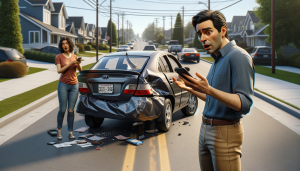Car accidents are chaotic, stressful, and often confusing events that can have a profound impact on your life. In the aftermath, it's crucial to be prepared and make informed decisions to protect your rights, health, and financial well-being. To help you navigate the post-accident landscape, we'll delve into ten common blunders and provide detailed guidance on how to avoid them.


Not Documenting the Accident Scene Properly
After an auto collision, your first instinct might be to check for injuries or move your vehicle out of traffic. While safety is paramount, it's equally crucial to document the scene thoroughly. Here's how to do it right:- Take Photos: Use your smartphone or a camera to capture images of the vehicles involved, the damage sustained, the road conditions, traffic signs, and any visible injuries. These photographs will serve as invaluable evidence for accident reports and insurance claims.
- Collect Information: Exchange contact and insurance information with the other parties involved in the accident. Note down their names, phone numbers, addresses, and insurance policy details. This information will be essential when filing a claim.
- Contact the Authorities: Depending on the severity of the accident, it may be necessary to call the police to the scene. A police report can provide an official account of the incident, which can be crucial for insurance claims and legal proceedings.
Neglecting Medical Care Immediately After Accidents
One of the most significant mistakes people make is neglecting their health after an accident. Even if you feel fine initially, some injuries may not manifest immediately. To avoid this mistake:- Seek Medical Attention: Regardless of whether you believe you are injured, it's essential to seek immediate medical attention after an accident. Some injuries, like whiplash or internal trauma, may not show symptoms until later. Prompt medical evaluation creates a record of any injuries and ensures you receive appropriate care.
- Follow Medical Advice: If a healthcare professional recommends treatment, follow their advice diligently. Failure to adhere to prescribed treatments can be used against you by insurance companies or in legal proceedings.
Admitting Fault Prematurely
In the confusing moments following a collision, you might feel inclined to apologize or admit fault, even if you're not entirely sure who was responsible. However, making statements of fault can have significant consequences:- Avoid Admitting Fault: It's crucial to refrain from making any statements of fault or guilt at the accident scene. Determining fault is a complex process that should be left to experts, such as insurance adjusters or legal professionals.
- Stick to Facts: When speaking to the other party involved or the authorities, stick to factual information rather than expressing blame. Stick to providing essential details and avoid speculating on the cause of the accident.

Overlooking the Details When Talking to Insurance Companies
Dealing with insurance companies can be challenging, and their representatives are skilled at extracting information that could harm your claim. To protect your interests:- Be Cautious: When discussing the accident with insurance adjusters, be cautious about what you say. Avoid giving recorded statements or providing unnecessary details. Remember that insurance companies aim to minimize their payouts, so it's essential to protect your rights.
- Consider Legal Representation: If you feel overwhelmed or unsure about how to interact with insurance companies, consider hiring an attorney who specializes in personal injury cases. They can communicate with insurers on your behalf and ensure your interests are safeguarded.
Failing to Consult with a Legal Professional
Navigating the aftermath of a car accident can be a complex and daunting process. Legal advice can be invaluable to help you understand your rights and options:- Consult an Attorney: It's wise to consult with a legal professional who specializes in personal injury cases after an accident. They can assess the specifics of your situation, advise you on your legal rights, and guide you through the complexities of the legal process.
- Understand Legal Timeframes: Different states have statutes of limitations that dictate how long you have to file a personal injury lawsuit. Consulting an attorney promptly can ensure you don't miss crucial deadlines.
Accepting the First Settlement Offer
Insurance companies often try to settle claims quickly, offering initial settlements that may not fully cover your losses. To avoid personal injury claim errors:- Assess the True Value: Before accepting any settlement offer, it's essential to understand the true value of your claim. This includes medical expenses, property damage, lost wages, and potential future costs such as ongoing medical treatments or rehabilitation.
- Consult an Attorney: An attorney can help you negotiate with the insurance company and determine whether a settlement offer is fair and comprehensive. They can also help you assess the long-term impact of your injuries.
Posting on Social Media
In the digital age, it's tempting to share your experiences online, but insurance investigators often check social media for evidence that could undermine your claim:- Exercise Caution: Refrain from posting about your accident, injuries, or recovery on social media platforms. Even seemingly innocuous posts can be used against you if they contradict your claims of injury or impairment.
- Adjust Privacy Settings: Review and adjust your privacy settings on social media platforms to limit who can access your posts and information.

Underestimating the Impact of a Car Accident
The full consequences of a car accident may not be immediately evident. It's crucial to consider potential future complications and expenses before finalizing any claims:- Consult Medical Professionals: If you sustain injuries, consult with medical professionals, including specialists if necessary, to assess the long-term impact of your injuries and potential future treatments or surgeries.
- Document Ongoing Costs: Keep detailed records of ongoing medical expenses, rehabilitation costs, and any adjustments you need to make in your daily life due to your injuries.
Not Collecting Witness Information
Witnesses can provide objective accounts of the accident, which can be invaluable during claims and legal proceedings. To avoid post-collision documentation errors:- Gather Witness Information: If there are witnesses to the accident, collect their contact information and statements. Witness testimonies can corroborate your version of events and strengthen your case.
Making Assumptions About Insurance Coverage
Never assume that your insurance policy will cover everything without checking the specifics. To avoid traffic accident misconceptions and insurance claim pitfalls:- Review Your Policy: Thoroughly review your insurance policy to understand its coverage limits, deductibles, and any potential gaps. If you have questions, consult your insurance agent to clarify your coverage.
- Consider Additional Coverage: Depending on your circumstances, you may want to consider additional coverage, such as uninsured/underinsured motorist coverage or medical payments coverage, to provide extra protection in case of accidents.
Conclusion
Car accidents are distressing events that can disrupt your life in numerous ways. The actions you take immediately following an accident and in the days, weeks, and months that follow are critical to protecting your health, rights, and financial well-being. By avoiding these common mistakes and following the guidance provided, you can navigate the post-accident landscape more effectively. Remember that being informed and prepared is essential in ensuring a smoother recovery and minimizing the impact of a car accident on your life. Taking the right steps after an accident can make all the difference, so stay vigilant, seek professional guidance when needed, and protect your interests as you move forward.Look for an attorney who has the right legal resources for your legal needs.
Contact us here on the Warmuth Law website or through our hotline 888-517-9888.











